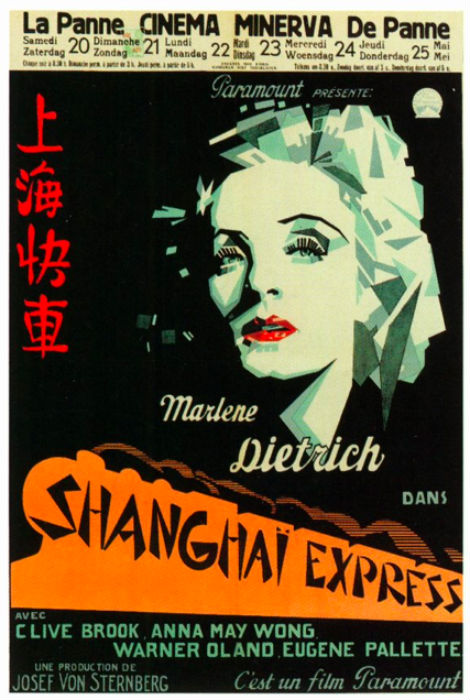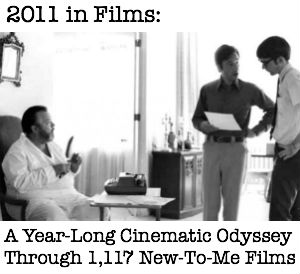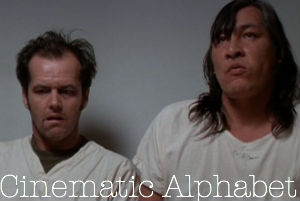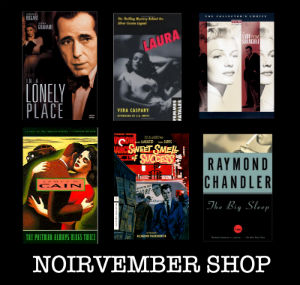Oscar Vault Monday – Shanghai Express, 1932 (dir. Josef von Sternberg)
Shanghai Express is an interesting film for a handful of reasons. For one, it was the fourth of seven collaborations between its star Marlene Dietrich and its director Josef von Sternberg. Also, it was made in the Pre-Code era, so it’s deliciously racy. But then there is some inherent racism that is very hard to ignore. It’s very “orientalist,” in that it’s almost voyeuristic in its look at China, having the villain by a “mysterious Eurasian,” (played by a Swedish American actor), and having Anna May Wong play a character who becomes a murderess. Regardless of its faults, Shanghai Express is a must-see classic film, anchored by a sultry performance from Dietrich. The film was nominated for three Academy Awards, winning one: Best Cinematography (won), Best Director and Best Picture. The other films nominated for Best Picture that year were: Arrowsmith, Bad Girl, The Champ, Five Star Final, One Hour with You, The Smiling Lieutenant and winner Grand Hotel.
Two things about the 5th Academy Awards ceremony: yes, there were only eight nominated films. The previous year there were five and the following year there were ten. Why there were only eight that year is unclear to me. If anyone has more information, do share! The other thing is that Grand Hotel is the only Best Picture winner to be nominated for Best Picture and nothing else. What a great film it is, though! But on to Shanghai Express.

This is definitely one of Marlene’s most seductive film roles, not surprising since she’s playing the elusive courtesan known as “Shanghai Lily.” While on the Shanghai Express train Lily runs into her old lover, whose love years earlier she tried to test and wound up driving him away instead. Lily still loves him, but he seems cold and indifferent. I think my favorite part of them film is their very first exchange where he says, “ah, so you’re Shanghai Lily” and she responds with something like, “It took more than one man to change my name to Shanghai Lily.” It’s such a decisive turn of the knife.
Lily’s ex-lover is Captain Donald “Doc” Harvey, played by British actor Clive Brook. The film takes place in 1931, right in the middle of the Chinese Civil War, which will later play a big role in the film. Brook plays Doc as the stereotypical “stiff upper lip’ type Brit. But as we find out through his conversations with Lily, it was the end of their relationship that has hardened him so. Brook imbues the character with just the slightest bit of longing throughout the film, showing the audience that he, too, realizes leaving Lily was a mistake.
Marlene sizzles as Lily, while Brook continues to play it very cool. This juxtaposition makes for some amazing chemistry between the two stars. The way that von Sternberg films, close and confined, adds to the intimacy of the film. Sternberg is known for his distinctive use of soft lighting and lenses; a technique that adds to the mystique and “faraway” feel to the film.
Which brings us to the blatant Orientalism. Maybe I only find this offensive because I studied this phenomenon in college and found it really disturbing. I don’t know. Have any of you seen this film? Did you feel the same way? Like I explained earlier, first you’ve got Swedish-American Warner Orland in yellowface, playing a stereotypical “mysterious Eurasian,” – which I guess might have been a fault of the book – written by an American, Jules Furthman. Naturally, he’s the villain. Maybe it’s reading too much into it that the man of mixed, but mostly Asian, race is the villain. But I hardly think it is.
Then you have Ann May Wong, who is fabulous, playing Hui Fei, another courtesan, though one who is much harder than Dietrich’s Lily. In one very disturbing sequence, when Lily rejects Chang’s advances he has Hui Fei forcibly brought to him. Why won’t he use force on Lily? I mean, I guess the film is arguing that Lily has Doc and Hui Fei has nobody to help her. But still. It’s awful. This leads to [SPOILER ALERT] Hui Fei eventually murdering Chang out of revenge. Luckily, this a Pre-Code film so the only punishment that befalls Hui Fei is some gossip and being ostracized by the other passengers. If this film had been made just a few years later, the production code would have insisted that she be punished on screen by imprisonment or something. For me Hui Fei is the real heroine in this film, though it’s Lily’s “sacrifice” for the love of Doc that is glorified.
Lastly, I wanted to talk about Louise Closser Hale as boarding house keeper Mrs. Haggerty. She is just such a bitchy old biddy and Hale plays the part to perfection. When the character is first introduced she’s telling Lily and Hui Fei that she only knows the most respectable people, not realizing that Lily and Hui Fei are both “ladies of the night.” The scene is just too funny. Later on, Mrs. Haggerty, not realizing that both Lily and Hui Fei have probably saved the lives of everyone on the Shanghai Express, says some pretty vicious things about the two of them, adding to the irony of her character.
Sadly, this film is not available on DVD, but you can still take a look at our Oscar Vault Monday aStore.
Posted on June 6, 2011, in Oscar Vault Monday and tagged 1932, Anna May Wong, Clive Brook, Josef von Sternberg, Jules Furthman, Louise Closser Hale, Marlene Dietrich, Oscar Vault Monday, Shanghai Express, Warner Orland. Bookmark the permalink. 8 Comments.























I don’t think the number of Oscar nominations was strict until 1944 or so. Before that it was just however many they thought deserved it.
I really want to see more Sternberg-Dietrich films – I saw The Devil is a Woman recently, and wow does their partnership work. The Asian thing is really common in early ’30s films, unfortunately – check out Frank Capra’s The Bitter Tea of General Yen, sometimes. Fascinating (and a good performance, as usual, from Barbara Stanwyck), but rather offputting as well.
yeah, I’ve seen that one. and The Good Earth and a few others with similar yellowface issues.
Very well written review.
I still don’t understand why the Oscar committee changed the Best Pictures nominations from 5 to 10 – it looses a lot of the prestige of getting nominated.
I think the reasoning on expanding to ten is that over the last few years, the Oscars have had a lot less mainstream appeal (which translates to lower ratings for the broadcast, which translates to lower ad revenue, etc.), for which they blame the relative obscurity of recent nominees. I can’t quite grasp that films like No Country for Old Men and There Will Be Blood were obscure, but that year (2007) in particular got lambasted for having a bunch of non-mainstream, late-release nominees that multiplex-goers hadn’t heard of and thus didn’t care about. Expanding to ten was SUPPOSED to let them nominate the best of the mainstream, wide-release films as well to increase viewer interest. Except that didn’t really happen, and last year we basically had a full slate of late-release indie/indiewood nominees.
Pingback: 2011 in Films: A Year-Long Cinematic Odyssey Through 1,117 New-To-Me Films « the diary of a film awards fanatic
Pingback: Oscar Vault Monday – Witness for the Prosecution, 1957 (dir. Billy Wilder) « the diary of a film history fanatic
Pingback: Pre-Codes, the 80s and Biblical Epics: March 2013 in Films | the diary of a film history fanatic
Pingback: Oscar Vault Monday – The Champ, 1931 (dir. King Vidor) | the diary of a film history fanatic